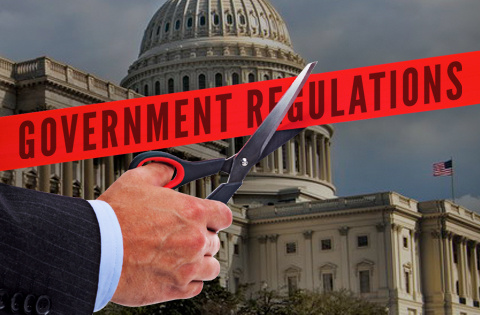
MacIver News Service | April 29, 2017
By M.D. Kittle
[Madison, Wis…] – Government bureaucracies are rife with irony.Here’s one: State agencies that promulgate costly rules and regulations for businesses, property owners and communities are now concerned that figuring out just how expensive said regs are could be costly to the agencies.
After being unceremoniously removed from Governor Scott Walker’s biennial budget (because it apparently was non-fiscal in nature), the REINS Act is back with a vengeance.
An amended version of the bill originally authored by Sen. Devin LeMahieu, R-Oostburg, and Adam Neylon, R-Pewaukee, this week narrowly passed in the Committee on Government Operations, Technology and Consumer Protection.
LeMahieu tells MacIver News Service the bill is in a “good place.”

“We’re hoping to get it on the Senate calendar in the next couple of weeks,” the senator said, adding that he believes he has at least 17 votes, but the amended version could push that to 20.
The Regulations from the Executive in Need of Scrutiny, or REINS, proposal is similar to legislation moving through congress, but with lower thresholds. It provides greater legislative oversight of the regulations adopted by state agencies. Any rule or regulation with an economic impact of more than $10 million would require legislative approval.
And it gives the legislature’s Joint Committee for Review of Administrative Rules more muscle. The committee would be empowered to request a public hearing earlier in the rule-making process and call for an independent review of the proposed regulation’s economic impact.
While LeMahieu said there has been relatively little pushback from bureaucrats regarding the REINS Act legislation, some agency officials have expressed concern that state departments could be subject to costly reviews of the regulations they propose. They worry that they’ll have to find money they don’t have in their budgets to cover the costs – much like the businesses and property owners the agencies force to comply with expensive regulations.
Such sentiments pretty much sum up the reason for the REINS Act, LeMahieu said.
“If it is going to have a relatively large impact on businesses or municipalities, essentially the citizens of Wisconsin, we should probably know that going forward,” the senator said.
The changes give agencies a bit of a break, to a point.
If an independent analysis sought costs over $50,000, the Joint Finance Committee would decide who would pick up the tab. The agency could still be on the hook.
Should an independent review show the proposed regulation’s impact to be more than 15 percent higher than the agency’s original estimate, the department would bear the cost of the outside analysis. It’s an incentive, the amendment’s author says, to foster agency accuracy.
The amended bill also gives the administrative rules review committee the ability to halt a proposed rule, LeMahieu said.
“I think that’s important. It beefs up the committee a little bit, giving legislators the ability to halt a rule if it is going above and beyond what the agency should be doing,” the lawmaker said.
LeMahieu noted a 2010 Wisconsin Department of Natural Resources stricter rule on phosphorous emissions. A 2015 economic impact review found the rule could cost businesses and municipalities $708 million per year. Costs could top $7 billion in 20 years.

U.S. businesses on average pay around $10,000 per employee in government regulations, according to a study by the National Association of Manufacturers. The cost is closer to $19,000 for manufacturers. Government rules and regs cost more than $2 trillion per year, the report finds.
The most recent semi-annual survey by Wisconsin Manufacturers & Commerce found that businesses see regulations to be the top obstacle to growth, for the first time edging out perennial favorite, taxes.
“That puts a fine point on the squeeze businesses are feeling,” said Scott Manley, senior vice president of Government Relations.
Excessive regulation takes away cash that businesses could be using to create jobs, expand operations, and grow the economy, Manley said. Ultimately, consumers pick up much of the costs.
The governor has the power to veto legislative decisions on an executive branch regulation. It would then be up to the legislature to to override the veto.
REINS has its share of supporters and critics.
The legislation is supported by free-market, limited-government advocate, Americans for Prosperity-Wisconsin.
“AFP strongly supports a key concept of this legislation – that citizens deserve to have a voice through their elected officials on regulations that threaten to significantly impact their lives or could put their jobs or businesses in jeopardy,” the organization stated in a recent press release.
Democrats and environmental activists see catastrophe written all over the REINS Act.
“While the legislation may seem innocuous on its surface, the proposal is rife with opportunity for corporations and politically connected interest groups to undermine regulations aimed at protecting the public good,” state Rep. Dianne Hesselbein, D-Middleton, told Wisconsin Public Radio earlier this month.
The bill’s authors say the proposal is about accountability, something too often missing from government.
“This bill will ensure that officials elected by Wisconsin citizens are able to hold state agencies accountable and have the necessary oversight over rules that impact citizens and businesses in all corners of our state,” Neylon said at a recent public hearing.
Sources say the bill is expected to soon move in the Assembly, where similar REINS Act legislation passed in the last session only to die at the Senate’s door step.